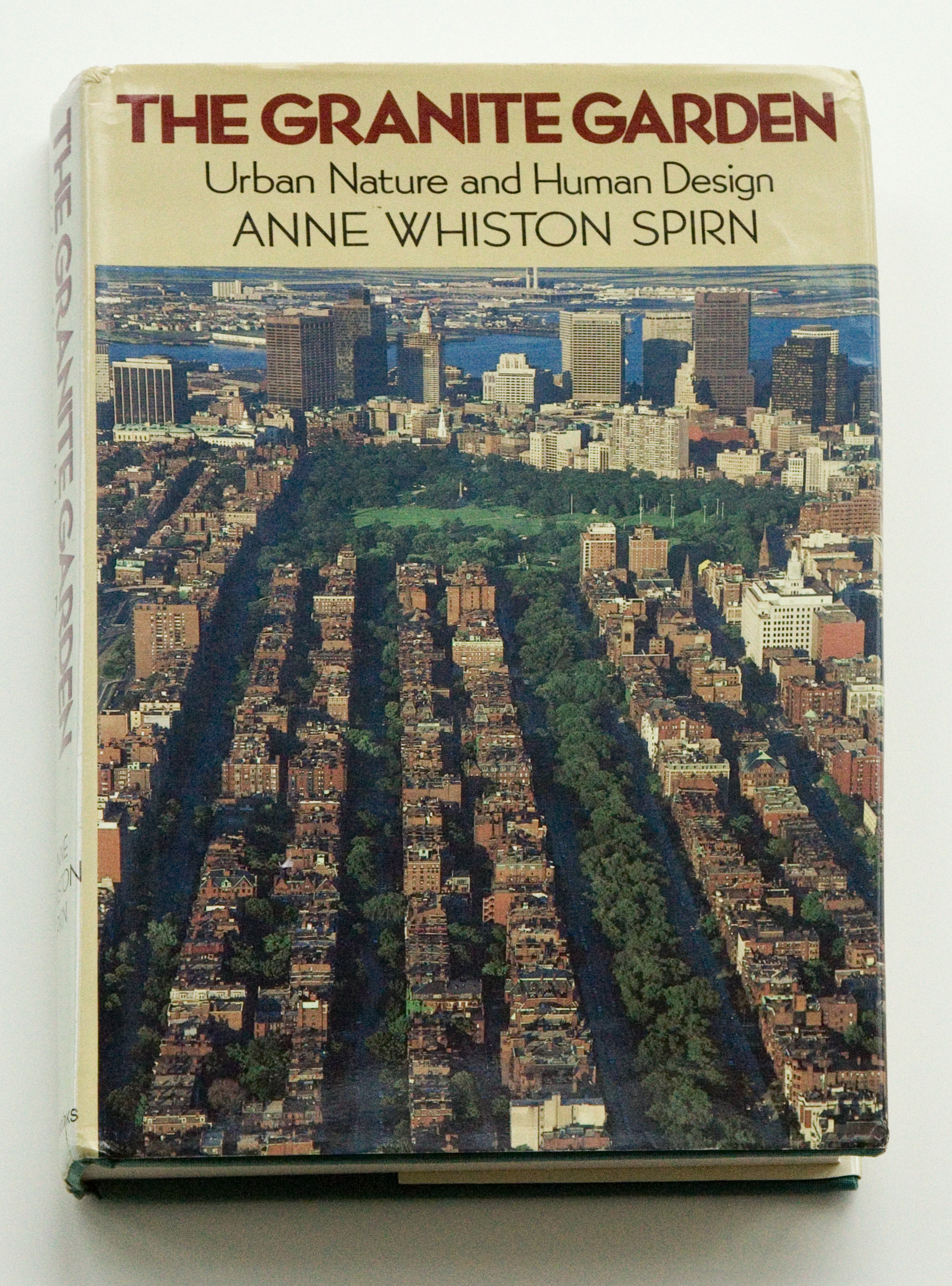The Granite Garden: Urban Nature and Human Design
1984
1984 President’s Award of Excellence, American Society of Landscape Architects
My goal was to transform the way people think about cities and thus to change the way cities are designed and built. So I wrote the book for a broad audience—for journalists, politicians, developers, and city dwellers, as well as for designers and planners, for practitioners as well as academics.
In the works: a new, expanded electronic edition that will feature new cases and reflect on changes since 1984.
"The Granite Garden deserves as wide readership as Silent Spring." Boston Globe
"In the literature of the city, Spirn belongs with Lewis Mumford and Jane Jacobs." Publishers Weekly
"If you care about cities, as they are or as they might be, don’t miss The Granite Garden. I am filled with admiration for this book—for its truly remarkable practicality, its uncommon precision, its unique scope and sweep.…Never before has anyone pulled together such a wide range of environmental information and applied it in a coherent and practical way to the situation of the city. At the end of her book, the author offers us something of a utopia, but, unlike earlier visions of the city, hers seems possible. Anne Whiston Spirn…here emerges as a leading spokesperson for the city."Jane Jacobs, author of The Death and Life of Great American Cities
"A beautifully, poetically written plea, which deserves the attention of all who wish for humane cities…. The book is so good, with its lovely language, thoughtful analysis, and tremendous scholarship." Ian McHarg, author of Design with Nature
“During the 1960s two books were published that have had a major impact on the thinking of architects, urban designers, and landscape architects….Jane Jacobs’ Death and Life of Great American Cities and Ian McHarg’s Design with Nature.…The Granite Garden admirably fills a gap between them. It is a book the design professions have needed for a long time. The book is a masterly synthesis of our present knowledge of urban nature and how it supports, and restricts the lives of human beings…The issues it raises impinge on every aspect of urban life and urban planning – social, cultural, economic, and aesthetic.” Journal of Planning Education and Research
“An eloquent and gripping summation of national peril that lies at the intersections of urbanization and the natural environment…It is the story of two equally plausible but opposite futures for urban America and of how scientifically informed urban natural design could lead us to the better outcome.….A clear vision of a profound dilemma, a book of and for our troubled times in urban America.” Annals of the Association of American Geographers
“The argument for a totally new approach in our perception of the city and nature is overwhelming…Spirn’s book is valuable in its strength and persuasiveness.” Washington Post
“A masterful work, imbued with a profound sense of environmental stewardship, a faith in human rationality, and the vision of the “humane” city as the indispensable setting for the good life.” Design Book Review
“A pioneering contribution to the literature on city form and meaning…it should be read by design practitioners, city officials, students, and researchers alike.” Journal of Architecture and Planning Research
“Three decades after its original publication…The Granite Garden remains one of the clearest, most cogent meditations on the power of landscapes as metropolitan systems.” Jane Wolff, Author of The Delta Primer
“The Granite Garden, launched a revolution in thinking about the relationship between nature, the urban environment, and we who inhabit these realms…the kind of thinking that today underlies Landscape Urbanism, Ecological Urbanism, Sustainable Urbanism …Anne was the first to understand and articulate these concepts to a broad audience. And she was among the first to practice and teach it.” Dennis Frenchman, MIT
“Anne pointed the way towards a sustainable future long before sustainability entered the professional lexicon….The Granite Garden has since served as a foundation for new vital strands of practice as Landscape Urbanism.” Ignacio Bunster, AECOM
“The Granite Garden (1984), single-handedly reinvigorated the urban ecology movement and its connection to design and planning, and is widely regarded as the most important book authored by a landscape architect in a generation.” Alan Berger, Author of Drosscape
